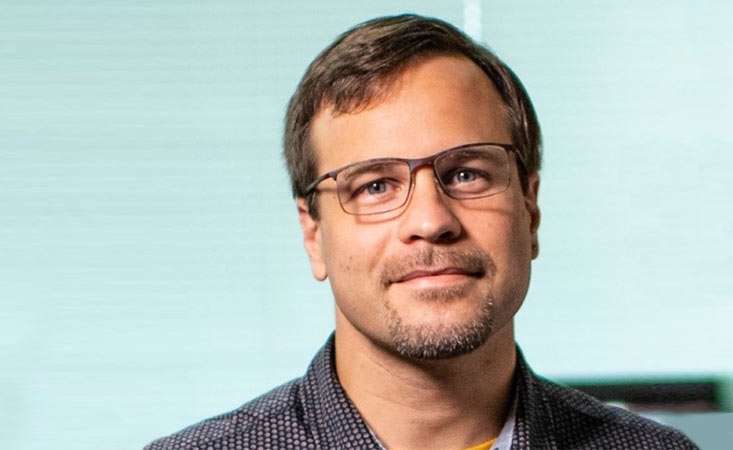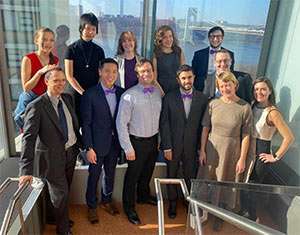
Kenneth Olive, PhD
Editor’s note: We recently announced the recipients of the Pancreatic Cancer Action Network’s (PanCAN) 2020 research grants. Now we’d like to introduce you to each grantee to share what brought them to the field of pancreatic cancer research and what this funding means to them.
Kenneth Olive, PhD, has been busy during the coronavirus disease (COVID-19) pandemic.
In addition to running a research lab virtually and caring for his children, the associate professor of medicine at Columbia University also took on a leadership role of a group of Columbia scientists who are helping in the fight against COVID-19.
“It was incredibly rewarding work, and I stand in awe of all that the postdocs, students and other volunteers accomplished during that time. But it was truly exhausting,” Olive said.
Olive found that quality time with his family could combat some of that exhaustion.
“At one point,” he recalled, “when I was working with my daughter on drawing, I picked up a set of pens myself and tried my own hand at pen and ink drawing. This turned out to be a great way to manage stress.”
When the pandemic hit, Olive’s lab, like many others, had to shut down and operate virtually for several months. Olive was relieved to find out during that time that he had been awarded a 2020 PanCAN Translational Research Grant.
“I knew that we would have the resources to continue a critical line of research and help jump-start the lab confidently when it came time to ramp up our research program again,” he said.
“In the midst of a very difficult time, this provided some desperately needed buoyancy, for which I remain incredibly grateful.”
Olive’s career in pancreatic cancer research was established in large part thanks to David Tuveson, MD, PhD – also a PanCAN grantee.
When Olive was finishing his PhD, he wanted more exposure to the clinical aspects of cancer.
“I knew I wanted to do translational research in an academic setting, but I was looking for a laboratory that embraced the idea of using genetically engineered models as a basis for translational studies. At the time, this was less common.”
Meanwhile, Tuveson was looking for someone to do just that.
“The timing was perfect,” Olive said. And Tuveson’s passion for the disease was contagious.
“As a medical oncologist, Dave was able to convey to me the urgency of the challenge of pancreatic cancer, and I very quickly was fully committed.”

Olive (front row, center) and his lab celebrated his senior staff associate receiving the prestigious Martha A. Hooven Award for an Officer of Research.
Olive joined Tuveson’s lab for his postdoctoral fellowship and then joined the faculty at Columbia University, where he received one of his very first grants as an independent scientist: the 2011 PanCAN Career Development Award, funded by Tempur-Pedic® Retailers.
“Funding is like oxygen to a scientist, and particularly so for a junior faculty member,” Olive said. “The grant I received then made it possible to scale my lab and approach challenging, fundamental questions about the disease.”
Today, Olive and his lab are studying a new line of research targeting cancer metabolism – one that Olive believes “represents a fundamental weak point for pancreatic tumors.”
Studying cancer metabolism involves looking at the way cancer cells gather and use nutrients differently than healthy cells. By targeting elements of these processes, Olive is aiming to find a cancer treatment that kills tumor cells without harming healthy cells.
In mouse models, Olive has found that a novel enzyme, cyst(e)inase, shows promise. It didn’t fully eliminate the cancer, though, so their next round of study will add other promising treatments in combination to see if that is even more effective.
The PanCAN award will allow them to continue that line of research without interruption.
PanCAN Translational Research Grants fund projects aiming to accelerate promising new treatment strategies and combinations, taking them from laboratory experiments to testing in patients.
Olive’s message to donors, who made this funding possible: “Your grant will make a direct impact in the fight against pancreatic cancer. Whether or not the specific combination of drugs that we test turns into an effective treatment, we will use your contribution to learn about this disease and improve our strategies for treatment.”
In addition to this direct research impact, he is paying it forward, recruiting junior scientists to work on pancreatic cancer research like Tuveson did for him.
PanCAN believes in the importance of bringing new researchers to the field, too. That is why our grant funding in 2021 – thanks to the support of generous donors – will be focused on Career Development Awards to continue to help early-career scientists establish themselves in the disease to ensure future progress.
“Every time we retain a junior scientist in this field, we amplify the impact of donor funding,” Olive said.
These next-generation scientists have also served to inspire Olive.
“Over the years, I’ve had several trainees work in my lab who were personally impacted by cancer, including some who lost close family members to pancreatic cancer. I am inspired by their commitment to making progress against a problem that is so personal to them,” he said.
And Olive is excited about the progress happening now.
“After working on this disease for over 15 years, I can say that I have never been more optimistic about the progress that is being made and the potential of new therapies that are making their way into the clinic. The sheer number of different, promising, new approaches to treating this disease is incredibly exciting.”















